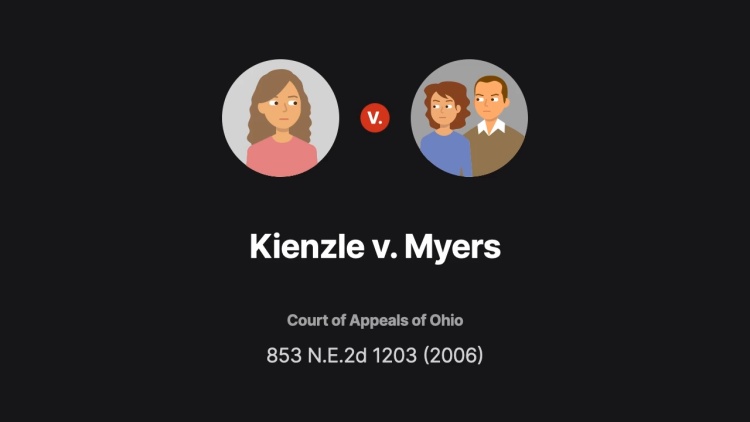Kienzle v. Myers
Ohio Court of Appeals
853 N.E.2d 1203 (2006)
- Written by Anjali Bhat, JD
Facts
Jo An Van Duyne and Ruth Bauer owned adjoining properties. In 1981, a public-sewer line was constructed along the road adjacent to both properties, and Van Duyne and Bauer were required to connect to the public system. Bauer would have had to excavate her driveway at considerable cost and inconvenience in order to directly connect to the public line. Accordingly, Bauer and Van Duyne agreed Bauer would install a line from Bauer’s home to Van Duyne’s line. Van Duyne’s line would then connect to the public line. If not for Van Duyne’s acquiescence, Bauer would have directly connected her line to the public line. The plastic sewer lines had an expected 50-year lifespan. In 1987, the Susan S. Kienzle Trust (Kienzle Trust) (plaintiff) acquired Van Duyne’s property. In 1989, Michael and Joan Myers (defendants) acquired Bauer’s property. On November 5, 2003, the Kienzle Trust revoked permission for the Myerses’ sewer line to cross the Kienzle property and connect with the Kienzle sewer line. The Kienzle Trust directed the Myerses to “make other arrangements” within 30 days and later threatened to “cap” the sewer line unless the Myerses made certain concessions. On March 26, 2004, the Kienzle Trust brought an action to quiet title with respect to the Myerses’ use of the property and enjoin further trespass. The Myerses denied an encroachment and brought a counterclaim, seeking a declaration of easement. The trial court found there was no easement and awarded the Kienzle Trust the cost of capping the sewer line. The Myerses appealed.
Rule of Law
Issue
Holding and Reasoning (Singer, J.)
What to do next…
Here's why 905,000 law students have relied on our case briefs:
- Written by law professors and practitioners, not other law students. 47,100 briefs, keyed to 995 casebooks. Top-notch customer support.
- The right amount of information, includes the facts, issues, rule of law, holding and reasoning, and any concurrences and dissents.
- Access in your classes, works on your mobile and tablet. Massive library of related video lessons and high quality multiple-choice questions.
- Easy to use, uniform format for every case brief. Written in plain English, not in legalese. Our briefs summarize and simplify; they don’t just repeat the court’s language.





